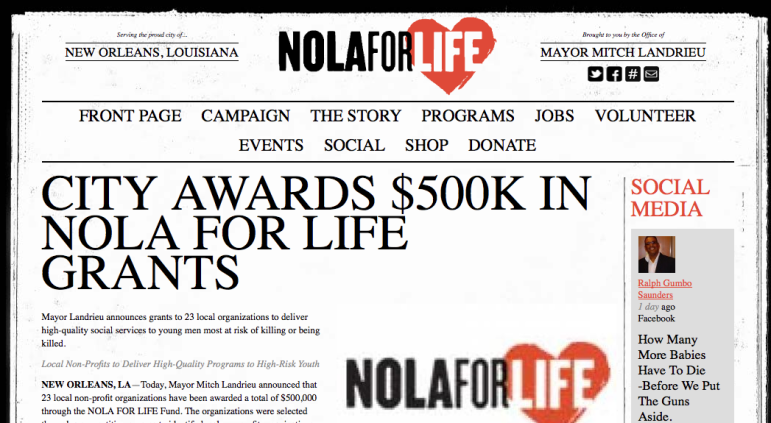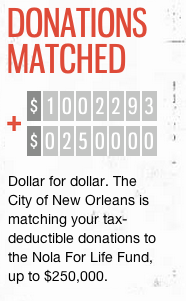
In touting his reforms to the process of awarding city money, Mayor Mitch Landrieu has repeatedly said, “It’s not about who you know. It’s about what you know.”
But when it comes to determining how $500,000 was given out through his signature homicide-reduction plan, NOLA for Life, the public knows very little.
That’s because the city has set up a fund at the Greater New Orleans Foundation and asked the private organization to administer the grant, which effectively shields the process from typical public scrutiny and accountability.
However, city officials have been involved deeply in the grant awards.
Aside from vague explanations, it’s difficult to determine precisely how and why 23 recipients of the money were selected out of 64 applications. Applicants with experience were rejected while new groups were awarded grants. And one politically influential recipient of the highest-level grant of $40,000 hasn’t followed through on other city and state grants it was awarded several years ago — nor did it provide required financial information in its grant application.
The public could be forgiven for thinking this is a public grant process.
Landrieu and other city officials initially took credit for securing a $1 million donation from Chevron to finance the grants, and they promised to contribute another $250,000 at the city’s disposal. But the administration and Chevron say the company’s donation was a private transaction with the foundation — the company said Landrieu’s acceptance of the donation on stage was “ceremonial” — and there’s no official pledge to donate city money to the effort. Therefore, the city said, how a private foundation chooses to make grants from a private donation is not subject to state sunshine laws or Landrieu’s own reform procedures, put in place his first days in office.
But consider these facts:
- The city created the fund at the Greater New Orleans Foundation in September.
- The agreement requires the foundation to provide the city with monthly reports.
- The Chevron donation landed in that city-established fund.
- The public request for grant proposals was issued in November 2012 by the city and the foundation jointly.
- Six city officials joined four foundation representatives in choosing the winners in January.
- The NOLA for Life website featured a statement titled “City awards $500K in NOLA FOR LIFE Grants” when the grants were announced.
- The city attorney has responded to public-records requests filed by The Lens, seeking copies of all grant applications.
- Deputy Mayor Judy Reese Morse spoke about the fund in a May presentation to City Council, not a foundation representative.
Though the organization initially was reluctant to discuss the matter, a representative of the Greater New Orleans Foundation did answer questions from The Lens after two other stories about the fund were published.
The rule and the exception
Usually, after the city requests and receives proposals from interested organizations or businesses, it schedules a public meeting of a selection committee to consider the responses, and it keeps a written record of its deliberations. The committee members create a scoring sheet, based on a clearly defined set of criteria that establishes a percentage for each point. For example, a typical request might say that 10 percent of the score will be based on whether an organization has offices in New Orleans. The committee’s work is done in the open, and the scoring sheet and any minutes of the meeting become a public record.

But in the case of the NOLA for Life Fund proposals, the selection committee met twice privately, no scoring sheet was created and no meeting minutes were kept.
That doesn’t mean the committee didn’t match the proposals against the key points laid out in the request for proposals, or RFP, said Martha Landrum, the foundation’s vice president of marketing and communications
“The NOLA for Life RFP identifies the criteria for selection by which proposals would be reviewed,” she wrote in an email. “Evaluators reviewed and discussed the proposals with these criteria in mind, favoring those that came closest to meeting the criteria.”
In her email response, she responded “N/A” to requests for written records. In answer to a follow-up question from The Lens, Landrum elaborated.
“While there were no scoring sheets used (i.e. no specific numbers or scores applied), the proposals were judged according to the criteria and the best ones chosen. This can be construed as a kind of ‘scoring.’ ”
The NOLA For Life Fund grant selection committee members’ names were not announced publicly. The city responded within the day when asked for its participants. The Greater New Orleans Foundation declined to identify its committee members for several weeks, despite several requests submitted by phone and email.
City officials on the committee, according to a May 29 email from former Landrieu spokesman Ryan Berni:
- Judy Reese Morse, deputy mayor and chief of staff
- Dr. Karen DeSalvo, health commissioner
- Ashleigh Gardere, adviser to the mayor for development
- Brooke Smith, adviser to the mayor for strategic partnerships
- Tyronne Walker, Innovation Delivery Team
- Charles West, Innovation Delivery Team director
On the foundation’s side, according a June 18 email from Landrum:
- Ellen Lee, senior vice president of programs
- Joann Ricci, vice president for organizational effectiveness
- Richard Martinez, program officer
- Flint Mitchell, program officer
The Lens has received grants from the Greater New Orleans Foundation through its separate IMPACT program, and Mitchell serves as the foundations’ program officer for The Lens grant.
The committee met on Jan. 4 and Jan. 18, Landrum wrote in the email. The dates were not announced publicly prior to the meeting.
Asked if Landrieu’s procurement process should apply to NOLA For Life Fund, Berni responded with a technical point.
“Our sweeping reforms of the contracting system were particularly for professional services procurements,” he wrote, meaning contractors with professional training and credentials like attorneys, doctors or accountants.
Regardless of the particular intent, though, Landrieu’s executive order is the only request for proposals process the city uses. In any case, the city requires a recorded rationale for any contract awarded through a competitive bid process.
“All of our competitive grants have been distributed in a transparent way,” Berni wrote. “Any documents that you’ve requested, including applications and financial information, have been provided.”
That’s not true, though. The Lens requested all monthly reports from the foundation to the city and all written communications about the fund on June 14. The city has yet to respond to either request.
What’s open and what’s public?
Reese Morse, who sat on the scoring committee, talked about the NOLA for Life Fund at a City Council committee presentation on May 22, saying that the process has been open.
“We look forward to the opportunity to talk about how the NOLA for Life Fund grantees received their money, in partnership with the Greater New Orleans Foundation,” she said. “It’s a very open and transparent process, and we look forward to the opportunity to talk about that in more detail.”
In an interview two days later, Council President Stacy Head said she hopes to hear more substance from the Landrieu administration.
“I am concerned about what appears to be a less-than-transparent process with little public awareness or, certainly, council awareness, about what we’re doing under the NOLA for Life umbrella,” she said in an interview. “The presentation we received this week was really more of a PR presentation than the nuts and bolts of it.”
Head may get to hear more about it soon. On Wednesday, July 24,* NOLA For Life is among several budgets that will be reviewed in a special joint meeting of the City Council’s Budget and Criminal Justice committees.
Among the organizations that won grants from the NOLA For Life Fund is the Family Center of Hope, run by the politically influential Watson family of Watson Memorial Teaching Ministries. The group was given $40,000 from the program even though it has already received millions to build a community center, a project that’s been stalled and tied up in numerous lawsuits for more than a year.
The group did not provide recent financial statements in its application.
Other grantees included untested organizations with little apparent connection to violence prevention.
The check from Chevron went directly to the Greater New Orleans Foundation, not the city, said Chevron spokeswoman Sakari Morrison.
“We didn’t write a check to the city. The city wasn’t included in the grant agreement,” she said, adding that Chevron, a private company, does not share grant agreements publicly. “When he was on stage and accepted a check, it was purely ceremonial.”
Still, the contribution was made to a fund that was established by the city, and city officials made up a majority of the committee that decided how that money was spent.
The city, meanwhile, has not contributed $250,000 to the fund, in spite of earlier claims — which remain on the NOLA for Life website.
As it turns out, the contribution is really more of an informal agreement. Asked whether the city had, in fact, given the money, Berni responded first that the city “made a commitment of $250,000” from the Wisner Fund. Asked for legal documents solidifying the commitment, Berni said there were none. The city hasn’t made any formal promise of funds, he clarified.
“We do still intend to give $250,000 of Wisner funds to the NOLA FOR LIFE Fund at GNOF, and a formal CEA [cooperative endeavor agreement] between the City of New Orleans and GNOF will be the official agreement governing that contribution,” Berni wrote in an email.
If city money had gone into the fund, it would be considered public money without question, subject to full disclosure under the Louisiana Public Records Act.
Ruling in the 1990 case Guste v. Nicholls, the State Supreme Court found that if a corporation accepts public money, it must divulge any records related to that money.
But that doesn’t mean all the money in the fund would be open to sunshine laws.
“If those corporations wish to avoid divulging nonpublic receipts and expenditures,” the court ruled, “they need only maintain separate and distinct books, accounts and records.”
*Correction: The original story said the joint committee meeting is set for Wednesday, June 26. While a meeting will take place that day at 1 p.m. to review several criminal-justice related budgets, NOLA for Life won’t be addressed until a subsequent meeting on Wednesday, July 24.

